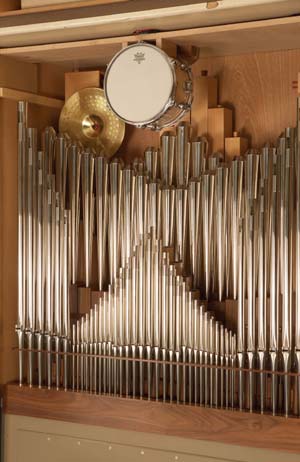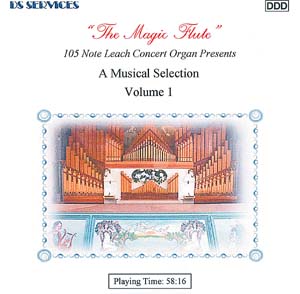




All rights reserved. This document, or any part of it, must not be reproduced in any format without prior written permission of the Fair Organ Preservation Society
©2025 - Fair Organ Preservation Society


CD Reviews
by Michael Morris
Celebrated Music of the 19th Century Volumes 1-3 have recently been released on CD. These recordings are quite noteworthy in that they feature an Orchestrion built in 2005 playing music that would have been heard in Queen Victoria’s day. This bold adventure has been accomplished by David R. Leach who is noted for building many mechanical pipe organs since 1977.
The production of the ‘Belisario Pipe Orchestrion’ and its associated repertoire of music has been a labour of love for over seven years for David and the resulting sounds are very interesting.
 The organ has 203 pipes each of which is individually controlled giving greater
musical scope and expression. For the well informed members perhaps with a knowledge
of church organs the pipes comprise Salicional, Vienna Flute, Octave Principal,
Cornopean Reed and Stopped Bass augmented by Triangle, Cymbal and Snare Drum.
The organ has 203 pipes each of which is individually controlled giving greater
musical scope and expression. For the well informed members perhaps with a knowledge
of church organs the pipes comprise Salicional, Vienna Flute, Octave Principal,
Cornopean Reed and Stopped Bass augmented by Triangle, Cymbal and Snare Drum.
Orchestrions are not normally heard on the rally field but tend to be in private collections or museums. Those in museums tend to be either fully restored playing very tunefully or unfortunately they make a lot of clattering and gasping sounds and are best left as quickly as possible. Welte made some very fine instruments playing from paper rolls while Imhof and Mukle were more associated with playing from pinned barrels containing up to 8 tunes per barrel. The ‘Belisario’ however plays from music created on a computer.
To get a second opinion on the CDs I lent one volume to an experienced organist with a very fine ear for music. He was most impressed with the quality of the pipework and the faithful reproduction of the original musical scores. Many of the pieces heard on these volumes are extremely rare and it is most likely that some of them have never been recorded in any form before. The music will appeal to those who enjoy Sir Arthur Sullivan, Franz von Suppe, Verdi and Rossini – music that would suit a Sunday afternoon classical concert.
Volume One comprises 18 tracks which include ‘Three Little Maids’ from ‘The Mikado’, ‘Light Cavalry’ by Franz von Suppe, ‘William Tell Overture’ by Rossini and ‘La Forca al Destino’ by Verdi.
The second volume has 15 tracks one of which is a delightful carol ‘O Holy Night’ by Adolphe Adam. ‘Nabucco’ by Verdi and Gounod’s ‘Faust’ also appear amongst the other less known pieces.
Volume Three contains 13 tracks which again reflect musical tastes over 100 years ago. David Leach has provided his own ‘Grand Fantasia’ on themes from Bellini’s Opera ‘Norma’ of 1831. Jacques Offenbach of can-can fame is included with his Overture to ‘La Fille du Tambour-Major’. The concluding piece is ‘Raymond’ by Ambroise Thomas from 1851.
A further 4 volumes entitled ‘Orchestrion in Concert’ should now be available and these include pieces such as ‘Washington Post March’, ‘El Capitan’, ‘The Yeoman of the Guard’, ‘Tannhauser’, ‘Iolanthe’, ‘Cox and Box’ and a very intriguing title ‘Suite for Mechanical Organ’ by Beethoven.
An advertisement regarding The Belisario Pipe Orchestrion appeared in (KF 4-06). If you are tempted to listen to something a little different and find out what your great-grandfather enjoyed then why not order a CD at the very reasonable cost of £3.40 and ask for a full list of music available. Cheques and postal orders should be made payable to D.R.Leach, 36 Valley Road, Cleckheaton, West Yorks BD19 3LJ.
 Volumes
1 & 2 of "The Magic Flute", Duncan Mallows David Leach Concert
Organ can be purchased for £10 each or £18 the pair, postage paid,
from 289 Hoghton Lane, Hoghton, Preston, PR5 0JD. Samples of the music can be
heard here. Enquiries for postage overseas
can also be made on the website.
Volumes
1 & 2 of "The Magic Flute", Duncan Mallows David Leach Concert
Organ can be purchased for £10 each or £18 the pair, postage paid,
from 289 Hoghton Lane, Hoghton, Preston, PR5 0JD. Samples of the music can be
heard here. Enquiries for postage overseas
can also be made on the website.
The organ was bought by Duncan in 2006 and named "The Magic Flute" to tie in with Mozart's 250th birthday celebrations. Built by David Leach and Ian Goodwin between 1995 and 1998 the instrument plays using a MIDI system using a slightly modified DECAP 105 note scale with 380 pipes both new and reclaimed. Ian was closely involved with the design and specification of this very interesting instrument. The sleeve notes remark that the Concert Organ was designed with 'a diverse range of instruments including a very deep bass'.
David Stubbs of DS Services, Manchester was responsible for the recording, production and artwork for the most enjoyable CD. The characteristics of a Belgian café organ are captured in pieces such as "Bungalow Foxtrot" and then the whole mood changes with the almost frenzied "Perpetuum Mobile" which puts the electro-magnetic action through its paces with exquisite effect.
Other pieces from the 18 tracks on Volume One include "Wheels Cha-Cha", "Thoroughly Modern Millie", "Lambeth Waltz" and a rousing finale with the "Light Cavalry Overture".
Volume Two continues with a further 18 tracks, commencing with "Radetzky March" followed by old favourites like "Canadian Capers", "By the Seaside" more commonly heard at the Blackpool Tower played by Reginald Dixon on the Wurlitzer, "Putting on the Ritz", "Sailor, Stop Your Roaming" an Austrian song from 1961 normally associated with Petula Clark and another good finishing piece with "Bandit Streichen".
 "This
is My Song" features a very original and very well restored Wilhelm Bruder
Sohne model 79, 48-keyless Organ owned by Andrew and Annabel Leach of 4 Daniels
Cottages, Newpound, Wisborough Green, West Sussex RH14 0AX, England. The very
accurate recording to CD can be purchased for £10 at shows or by post
adding £1 (UK) and £2 (European members) p&p.
"This
is My Song" features a very original and very well restored Wilhelm Bruder
Sohne model 79, 48-keyless Organ owned by Andrew and Annabel Leach of 4 Daniels
Cottages, Newpound, Wisborough Green, West Sussex RH14 0AX, England. The very
accurate recording to CD can be purchased for £10 at shows or by post
adding £1 (UK) and £2 (European members) p&p.
A three year labour of love has seen this most pleasing organ emerge from a completely worn out instrument which fortunately had never been altered from its original design. We can therefore hear the 1926 instrument very much as it left the factory in Waldkirch in Germany. The recording by Graham Spencer makes it possible to really enjoy the music of this exceptionally well restored Wilhelm Bruder Sohne organ.
Andrew and Annabel have built up a good library of music with modern additions from Jan Kees de Ruijter and Tom Meijer, these complement some original Wilhelm Bruder books that were obtained when the organ last changed hands; one such piece being "Polly-Wolly, Rheinlander Schottisch" - the childrens song Polly Wolly Doodle can definitely be recognised in this tune.
There are 21 tracks on the CD and as Andrew tells me the music that the organ plays is designed to show off the capabilities of this compact little organ that really sounds as though it is a much larger instrument. Marches include "Father Rhine", "Graf Zeppelin", National Emblem" and "Hock-Heidecksburg". Waltzes include "Les Sirenes", "Estudiantina", both by Emil Waldteufel ,"Destiny" by Baynes and "Donausagen" from Fucik. Lively dance pieces include a "Swing Medley", "St Job's Boogie", "Twelfth Street Rag" and "Temptation Rag".
The title of the CD "This is My Song" is the second track. I have often heard this sung by Harry Secombe and Petula Clark but never realised that it was written by the great silent era comedian Charlie Chaplin who also wrote "Limelight" which is not included.
Finally, if you want to listen to a good German organ with sparkling percussion that is pleasing to the ear you won't be disappointed with this rare CD.
 Ian
Crisp presents "Het Kleine Juweel" (The Little Gem) Volume 5 is now
available and may well be the last CD to be commissioned by Ian. The extremely
tuneful CD can be purchased by post for £8.75 from Ian at The Cottage,
Green End, Weston, Hitchin, SG4 7AL; Tel 01462 790333.
Ian
Crisp presents "Het Kleine Juweel" (The Little Gem) Volume 5 is now
available and may well be the last CD to be commissioned by Ian. The extremely
tuneful CD can be purchased by post for £8.75 from Ian at The Cottage,
Green End, Weston, Hitchin, SG4 7AL; Tel 01462 790333.
The 56-key Dutch street organ was built in 2001 by Albert Pluer of Bussum near Amsterdam and is operated by the Casio digital system. The recording by Ken Slow is very accurate and the excellent performance of The Little Gem is most pleasing.
All 20 tracks are the work of Tom Meijer, one of Holland's leading arrangers of mechanical music. He certainly knows how to make music go with a swing and the “Glen Miller Story” Medley certainly shows how a full sized orchestra can be replicated so enjoyably. Other medleys include renditions from Abba, Al Jolson, American Civil War Tunes, Oklahoma, American Waltzes and Samba dance music. The Shadows will be remembered with “Apache” from 1960 and their associate Cliff Richard is represented with “Congratulations” that he sang at the Eurovision Song Contest in 1968. The ever popular “El Condor Pasa” normally heard on pan pipes is another magnificent performance.
For me the best track on the CD is “Cherry Pink and Apple Blossom White”. This is a fast flowing piece that really tests the organ - displaying the contrasts in pipework and effective percussion that all seems to come out effortlessly - a wonderful tribute to the arranger, organ builder and tuner.
In conclusion, if you enjoy a good street organ you should take advantage of this CD and perhaps the previous 4 volumes which may still be available at the same price.
Review © 2007 Michael Morris
Originally published in edition 2 of The Key Frame 2007.